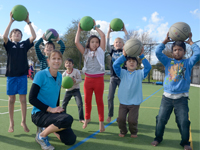

<p><img class=" alignright size-full wp-image-695" style="margin: 5px; float: right;" alt="Project Energize" src="http://schoolnewsnz.fastrackdev.com/wp-content/uploads/2013/12/Project_Energize.jpg" width="200" height="150" />Analysis from AUT University has confirmed a healthy eating and activity programme now in all Waikato primary schools is saving taxpayers money as well as improving lives.</p>
<p> <!--more--> </p>
<p>The programme is delivered to all 44,000 primary aged children in the Waikato, 36 per cent of whom are Māori. This is 10 per cent of the New Zealand primary school population and 15 per cent of the New Zealand primary school population who are Māori.<br />Project Energize was initiated in 2004 with an objective of improving the health and wellbeing of children in the Waikato. An online publication in June 2013 of the prestigious British Journal of Nutrition confirms that in 2011 Waikato children have a healthier body weight for age and can run faster than children measured five to 10 years earlier The analysis took into consideration ethnic group, school and school socio-economic status, sex and age</p>
<p>The success of Project Energize has led to the programme being rolled out to clusters of schools in Franklin and Northland as well as the Ministry of Health recently announcing recently $1.1million of funding for it to be expanded to over 100 pre-schools and 4000 children in the Waikato.</p>
<p>Project Energize is funded by the Waikato District Health Board (DHB) and is run by Sport Waikato through a team of 27 &#8216;Energizers&#8217;. Each Energizer works with eight to 12 primary schools and teachers to support physical activity and healthier eating activities.<br />The Energizers work closely with the teachers taking &#8220;Huff and Puff&#8221; games and activities that get all the children moving, demonstrations of why water and milk are the best drinks and how to make a healthy cheap sandwich.</p>
<p>Lead researcher, AUT&#8217;s Professor Elaine Rush, says Project Energize is going from strength to strength and demonstrably improving the lives of Waikato children, their families, their teachers and the nutrition and physical activity environment of the school.</p>
<p>&#8220;While obviously there is an initial cost to run Project Energize, it saves money long-term by reducing the healthcare budget. Waikato DHB should be congratulated for its forethought in improving the health of people in this part of the country,&#8221; she says.</p>
<p>Currently Waikato DHB allocate just under $2million annually for the project but at less than $45 per child it is good value for money says Professor Rush. This is less than the cost of one visit to a doctor.</p>
<p>We know the investment we make into Project Energize is one we will get great returns on for many years to come in the form of healthier adults who will cost the health sector less,&#8221; said Waikato DHB <a class="wpil_keyword_link" href="https://www.schoolnews.co.nz/2015/10/new-chief-executive-for-education-council/" title="chief executive" data-wpil-keyword-link="linked" target="_blank">chief executive</a> Craig Climo.</p>
<p>&#8220;The positive effect of the work Project Energize does with these children is far reaching. What they learn at school, they pass on at home. Healthy lifestyles benefit families mentally as well as physically,&#8221; he says.</p>
<p>Professor Rush says children are growing and are meant to get bigger. &#8220;Growing too fast, not eating the best foods and not being able to run fast has flow-on adverse health implications for the rest of the child&#8217;s life.</p>
<p>&#8220;These effects are intergenerational so this will benefit the next generation as well. It is for our children&#8217;s children,&#8221; she says.</p>

EXCLUSIVE: Teachers used to be paid two to three times more than minimum wage workers,…
After an “overwhelming” vote to reject the latest Government offer, secondary school teachers will begin…
Second-language learning should be compulsory, says a new report from a forum bringing together academics,…
A new entitlement aimed to improve access to learning support coordinators for schools with students…
Educators have raised questions about the Ministry of Education’s new secondary school subjects, set to…
Professional learning and development (PLD) for teachers needs to be higher impact for teachers and…
This website uses cookies.